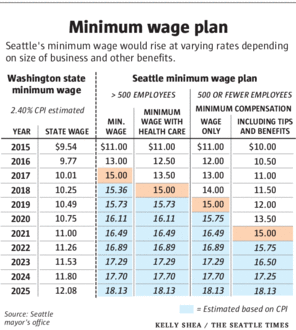Seattle City Council approves historic $15 minimum wage, businesses plan to raise prices & sue
< < Go Back
Seattle City Council approves a $15 minimum wage, creating a path over the next seven years to provide the highest minimum wage in the country.
The Seattle City Council unanimously approved a $15 minimum wage Monday, giving its lowest-paid workers a path over the next seven years to the nation’s highest hourly pay.
The outcome was not in doubt as a progressive mayor and City Council throughout the spring vowed to address the national trend of rising income inequality and a city that has become increasingly unaffordable for many of its residents.
But amid the celebration outside City Hall after the vote, cautionary notes also were sounded about Seattle’s leap into the unknown.
“No city or state has gone this far. We go into uncharted territory,” said Seattle City Council member Sally Clark before the council agreed to give workers a 61 percent wage increase over what is already the country’s highest state minimum wage.
Within minutes of the vote, an organization representing national franchises vowed to sue over the law’s treatment of them as large businesses.
And 15 Now activists, who are collecting signatures for a charter amendment that would speed up the phase-in to three years, said they haven’t yet decided whether to go forward with the measure for the November ballot.
A standing-room-only crowd made up largely of fast-food workers, union activists and 15 Now volunteers cheered the council’s vote.
“We did this. Workers did this. Today’s first victory for 15 will inspire people all over the nation,” said Councilmember Kshama Sawant, whose election in November on a $15-an-hour minimum platform helped galvanize the Seattle effort.
Mayor Ed Murray praised the vote as a bold step to address what he called more than three decades of economic policy that resulted in a dismantling of the middle class.
“Today we have taken action that will serve as a model for the rest of the nation to follow,” he said.
Council members acknowledged it would take more than a gradual pay increase to make the city more affordable.
But even as labor activists began celebrating, the International Franchise Association announced plans to sue Seattle to overturn the ordinance.
Steve Caldeira, the association’s president and chief executive officer, said it unfairly counts local franchise owners as large employers because of their ties to national or global chains and gives them only three years to phase in the increase, while many of their nonfranchise competitors have seven years.
In all, 600 franchisees employ 19,000 workers at 1,700 establishments in Seattle, he said.
“These are independently owned small businesses who have their own skin in the game. They’ve either invested their life savings or taken out loans, or maybe done both, to take a shot at the American dream,” he said in an interview at City Hall.
“We intend to aggressively sue the city of Seattle for what we believe to be an extremely unfair and discriminatory policy against those hardworking, jobs-creating small-business owners.”
Local franchisee David Jones, who owns two Subway stores in Seattle, puts his cost of a $15 minimum at $125,000 annually. He pays the stores’ 18 employees $10.50 an hour, on average; he figures he’ll have to raise sandwich prices by a dollar or more to maintain profits.
More From Seattle Times:




